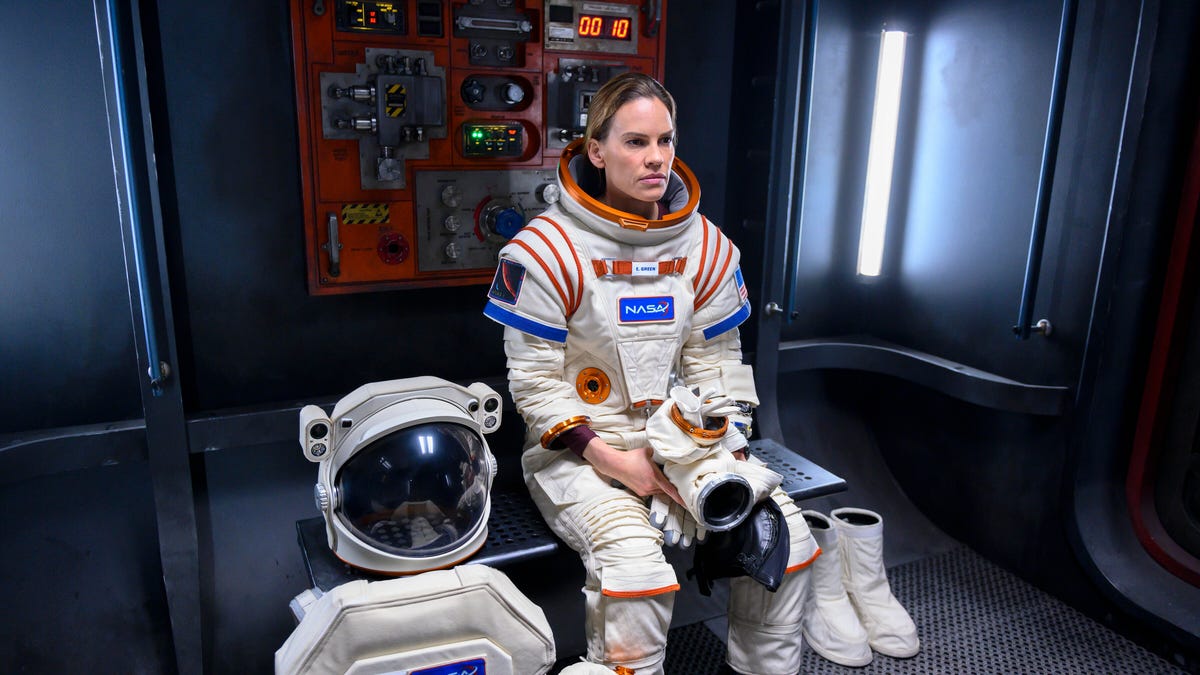Netflix's latest space drama, Away, is a trip to Mars worth taking
Review: Hilary Swank heads to Mars as a NASA astronaut with Earthly baggage.

Hilary Swank has her eyes on Mars in Netflix's Away.
As soon as you introduce humans into the infinite vacuum of space, they'll fill it with their worst and best -- personal hang-ups, cultural biases, pettiness, but also ingenuity and optimism.
All of this is on full display in Away, a solid Netflix drama out now that stars Academy Award winner Hilary Swank. It joins a small fleet of movies and TV shows offering the Earth-bound a reality-tethered glimpse of the sacrifice and struggle inherent in space exploration.
Away is based on a 2014 Esquire article by Chris Jones about NASA astronaut Scott Kelly, who spent a year aboard the International Space Station. The show takes the basic themes of the article, like grappling with the physical and emotional distance from loved ones, and transfers them to an international team of five astronauts, helmed by Commander Emma Green (Swank), as they embark on a three-year round-trip journey to Mars for the first time.
The show splits its time between the crew of the spaceship Atlas, floating around and fixing life-threatening problems while managing their excitement and trepidation, and Green's family back in Houston.
In the first episode, a health crisis back home forces Emma, who's on the moon waiting to launch to Mars, to choose between family and mission. All the while, an incident causes some of her crew -- including the older, more experienced Russian cosmonaut Misha Popov (Mark Ivanir) -- to question her leadership abilities.
The message is clear: Had Emma been a man, none of this would be up for debate.
Away shows how even the most ascendant women aren't immune to workplace drama and sexism.
If Emma chooses work, she's a bad mom. If she chooses family, she's "spitting in the face of women" everywhere, as one character says. It's a nearly impossible dilemma. But on Swank's shoulders, nothing is more believable than her full range of motion from concerned wife and mother to highly accomplished NASA astronaut and -- above all -- human being trying to figure it all out.
Vivian Wu and Ray Panthaki in the Atlas' command module.
Gender dynamics aren't the only bit of baggage loaded in the Atlas' cargo hold. Away is also keenly aware of the journey to Mars as a "global effort," packing astronauts from the US, India, China, Russia and the UK into a tin can. Space politics is its own thing.
"Reaching Mars might prove to be not just the greatest achievement for science, but for our planet," Green says at a prelaunch press conference. On board it's not all harmony, as the crew members learn to deal with and accept each other as individuals coming with different life experiences and cultural frames of reference. Chinese astronaut Liu Wang and Emma, for example, butt heads when it comes to how they approach parenting from space, and what they mean as symbols in their respective countries.
It's hard not to make space serious. It's a death trap. In the past several years multiple shows and movies have, with solemn tones, driven home how difficult space exploration is. National Geographic's Mars interspersed real documentary footage and dramatizations of the colonization of the red planet to explain everything from dealing with long term psychological strain in space to the seemingly inevitable battle between the scientists who want to study Mars and the corporations that'll want to strip it for resources. Hulu's The First, focused on the least sexy part of the whole process: politics and bureaucracy.
Along those lines, there are moments when Away takes narrative routes that are familiar from other TV dramas. Each crew member, for example, gets his or her own backstory episode -- some more successful than others. Certain characters develop feelings for each other in the midst of this high-stress situation. Swank starts visualizing her husband Matt (Josh Charles), a NASA engineer, on the ship, counseling her and supporting her through her travails.
There's also fun space stuff, too. Misha makes vodka. Botanist Kwesi's (Ato Essandoh) busies himself growing space salad. Everyone agrees the Chinese National Space Agency packed the best food.
Overall, Away is a fine, well-made drama that underlines just how human even the best of us are, even in the least human-friendly situations.

